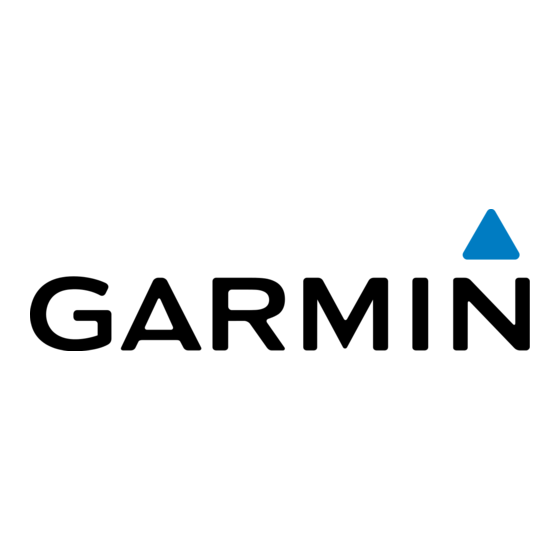Garmin GPSMAP 547 Manuel du propriétaire - Page 30
Parcourez en ligne ou téléchargez le pdf Manuel du propriétaire pour {nom_de_la_catégorie} Garmin GPSMAP 547. Garmin GPSMAP 547 38 pages. Important safety and product information
Également pour Garmin GPSMAP 547 : Manuel de démarrage rapide (4 pages), Manuel d'instructions d'installation (8 pages), Informations sur le produit (20 pages)

Setting the Water Temperature Offset
Before you can set the water temperature offset, you must have
a NMEA 0183 water-temperature sensor or a temperature-
capable transducer to measure water temperature.
The temperature offset compensates for the temperature
reading from a temperature sensor.
1
Measure the water temperature using the temperature
sensor or temperature-capable transducer that is connected
to the chartplotter.
2
Measure the water temperature using a different temperature
sensor or a thermometer that is known to be accurate.
3
Subtract the water temperature measured in step 1 from the
water temperature measured in step 2.
This is the temperature offset. Enter this value in step 5 as a
positive number if the sensor connected to the chartplotter
measures the water temperature as being colder than it
actually is. Enter this value in step 5 as a negative number if
the sensor connected to the chartplotter measures the water
temperature as being warmer than it actually is.
4
Select Settings > My Vessel > Temperature Offset.
5
Enter the temperature offset calculated in step 3.
Communications Settings
NOTE: Some settings and options require additional charts or
hardware.
Select Settings > Communications.
Serial Port 1: Sets the input/output format for port 1 to use
when connecting the chartplotter to external NMEA devices,
computers, or other Garmin devices.
Serial Port 2: Sets the input/output format for port 2 to use
when connecting the chartplotter to external NMEA devices,
computers, or other Garmin devices.
NMEA 0183 Setup: Sets the NMEA 0183 sentences the
chartplotter transmits, how many digits to the right of the
decimal point are transmitted in a NMEA output, and how
waypoints are identified
NMEA 2000 Setup: Allows you to view and label the devices on
the NMEA 2000 network
Wireless Devices: Allows you set up wireless devices
(page
24).
NMEA 2000 and NMEA 0183
GPSMAP 500 series and GPSMAP 700 series chartplotters can
accept data from both NMEA 0183 devices and certain NMEA
2000 devices connected to an existing NMEA 2000 network on
your boat.
echoMAP 50 series and echoMAP 70 series chartplotters can
accept data from NMEA 0183 compliant devices.
NMEA 0183
The chartplotters support the NMEA 0183 standard, which is
used to connect various NMEA 0183 devices, such as VHF
radios, NMEA instruments, autopilots, wind sensors, and
heading sensors.
To connect the chartplotter to optional NMEA 0183 devices, see
the chartplotter installation instructions.
The approved NMEA 0183 sentences for the chartplotter are
GPAPB, GPBOD, GPBWC, GPGGA, GPGLL, GPGSA,
GPGSV, GPRMB, GPRMC, GPRTE, GPVTG, GPWPL,
GPXTE, and Garmin proprietary sentences PGRME, PGRMM,
and PGRMZ.
This chartplotter also includes support for the WPL sentence,
DSC, and sonar NMEA 0183 input with support for the DPT
(depth) or DBT, MTW (water temperature), and VHW (water
temperature, speed, and heading) sentences.
24
(page
24).
(page
24).
NMEA 0183 Settings
Select Settings > Communications > NMEA 0183 Setup.
Route: Enables NMEA 0183 output sentences for routes.
System: Enables NMEA 0183 output sentences for system
information.
Garmin: Enables NMEA 0183 output sentences for Garmin
proprietary sentences.
Sounder: Enables NMEA 0183 output sentences for the
sounder (if applicable).
Posn Precision: Adjusts the number of digits to the right of the
decimal point for transmission of NMEA output.
Waypoint IDs: Sets the device to transmit waypoint names or
numbers via NMEA 0183 while navigating. Using numbers
may resolve compatibility issues with older NMEA 0183
autopilots.
Defaults: Restores the NMEA 0183 settings to the original
factory defaults.
NMEA 2000
GPSMAP 500 and 700 series chartplotters are NMEA 2000
certified and can receive data from a NMEA 2000 network
installed on the boat to show specific information, such as
depth, speed, water temperature, wind speed and direction, and
engine data.
You can also name your engines and tanks so that you can
better identify their location on the boat.
To connect a GPSMAP chartplotter to an existing NMEA 2000
network and to see a list of supported NMEA 2000 PGN
numbers, see the chartplotter installation instructions.
Viewing a List of NMEA 2000 Network Devices
You can view the devices connected to the NMEA 2000
network.
Select Settings > Communications > NMEA 2000 Setup >
Device List.
Communication with Wireless Devices
The chartplotters can create a wireless network to which you
can connect wireless devices. Also, some models can connect
to Bluetooth ® wireless devices using the AVRCP profile.
Connecting a Bluetooth Wireless Device
You can wirelessly connect the chartplotter to a Bluetooth
device.
1
Place the Bluetooth device within 33 ft. (10 m) of the
chartplotter.
2
Select Settings > Communications > Wireless Devices >
Bluetooth Devices > Bluetooth.
3
Follow the on-screen directions.
Disconnecting a Bluetooth Wireless Device
1
Select Settings > Communications > Wireless Devices >
Bluetooth Devices > Device List.
2
Select a device.
3
Select Forget Device.
Setting Up the Wireless Network
The first time you access the Wireless Network settings, you are
prompted to set up the network.
1
Select Settings > Communications > Wireless Devices >
Wireless Network > On.
2
Enter a name for this wireless network.
3
Enter a password.
You will need this password to access the wireless network
from a wireless device.
Device Configuration
